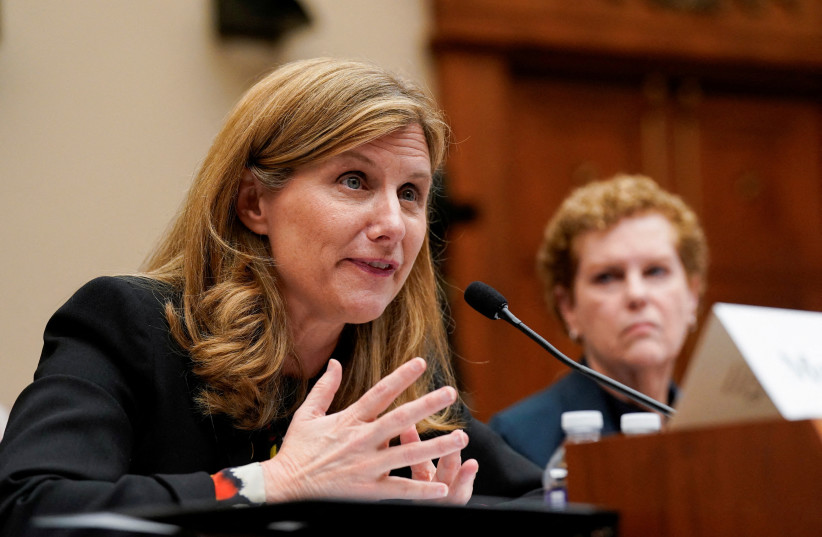You’ve probably seen the clips: Three presidents of top universities unable to condemn calls for genocide of Jews without knowing “the context.” As a Jew who lost most of my parents’ generation, including all my grandparents, to “the context” of the Holocaust, I, like Jews and non-Jews worldwide, was appalled, angered, and disgusted.
Also nostalgic; because I remember a college class years ago where I could freely express my Jewish identity in a classroom led by non-religious, left-wing feminists. They disagreed vehemently with what I had to say, but respected, no, celebrated my right to say it.
Brooklyn College, in the late 1970s. For scheduling reasons, I found myself in a women’s studies class, co-taught by a history and a literature professor, both ardent feminists. The syllabus reflected an openly feminist agenda.
The final assignment also embodied 1970s feminist ideology (in those days called “Women’s Liberation”). We’d been assigned a weekly journal in which our written entries had to connect to gender. The teachers specifically described the point of the exercise: proving gender as the main component of human identity.
Only, for me, it wasn’t.

I discovered that my Jewish identity took precedence over my identity as a woman
I tried. Every week I wrote paragraphs, poems, personal essays, and analyses of articles and books linked to female identity. For the final assignment, we had to re-read and reflect on our own gender-driven journal entries and write a final essay with our conclusions.
In that essay, I discovered that my identity as an observant Jew took precedence over my identity as a woman. Judaism infused my journal entries. Joy in Jewish holidays. Pain, strength, and resilience growing up in a Holocaust-touched family. Jewish faith, Jewish fun, Jewish dilemmas. Being a woman mattered, of course, but on reflection, I discovered it was a distant third to being Jewish. (Number two? My identity as an identical twin, a tale for another piece.)
If I submitted that final essay today, would I stand by my conclusions, though they directly contradicted my professors’ beliefs? Today many college students feel forced to remove their Magen David necklaces or hide their kippot under hats. I can only imagine how many of them hide their ideas and their identities in class discussions and assignments. Today would I, too, feel forced to change my journal’s conclusion to match my teachers’ ideology and expectations, and get the sought-after A grade?
I can’t answer that, because back in the day when liberal arts meant true liberalism, I knew I could express my opinions – and my Judaism – freely, fearlessly, even when those were at odds with my professors’ worldview. Not like in academia today, when too often the right to express an opinion exists, as long as it comes out of left-wing ideology; when freedom of speech seems to be the privilege only of those who agree with their “woke” professors; when ideas don’t have to have facts behind them since “narrative” trumps historical evidence – if that narrative aligns with left-wing philosophy.
IN ACADEMIA today, too often “micro-aggression” against certain minorities disallows free speech, while “macro-aggression” against Jews needs “context.”
Well, here’s some of that context: A strong statement of Jewish identity can cause Jewish students to be threatened with lower grades; with swastikas painted on dorm doors; with death threats; even with physical violence.
So here’s a Jewish concept that the university presidents should learn: heshbon hanefesh – a deep and sincere moral accounting. Instead of the tepid apologies and explanations we’ve heard from academia about the antisemitism on campuses, even more than the resignation of the president of University of Pennsylvania, academic leaders should be asking themselves what has gone wrong in the past decades. Universities used to be liberal, truly liberal.
University studies encouraged critical thinking. Students could express a variety of opinions. Class discussion could be heated, but opinions had to be backed up by facts and expressed civilly. When university students in keffiyas scream “from the river to the sea,” and they don’t have a clue which river or which sea they are shouting about, they clearly aren’t getting the liberal education that I enjoyed.
And so I return to the past: I got back my women’s studies journal with its final essay. My feminist, left-wing professors wrote that they admired the graceful way (their words) I combined my different and occasionally contradictory identities. My essay disputed their strongly-held ideas, challenged the whole point of the course. But in truly liberal fashion, my professors found a truth not their own acceptable and thought-provoking, and a strong sense of Jewish identity reason for celebration. My essay about the strength of that Jewish identity, backed up with stories from my life and facts from my family’s Holocaust background, gained their respect and even admiration.
And yes, it got me an A in the course.
The writer is a senior lecturer in literature and creative writing at Michlalah – Jerusalem College. She holds a doctorate in English literature from the University of Rochester and lives in Beit Shemesh. In addition to her academic publications, she has written books and articles for the Jewish world.
